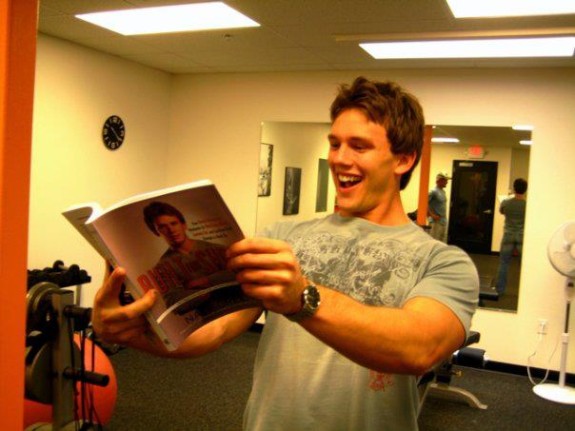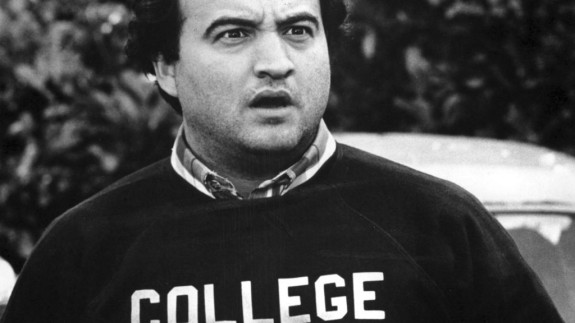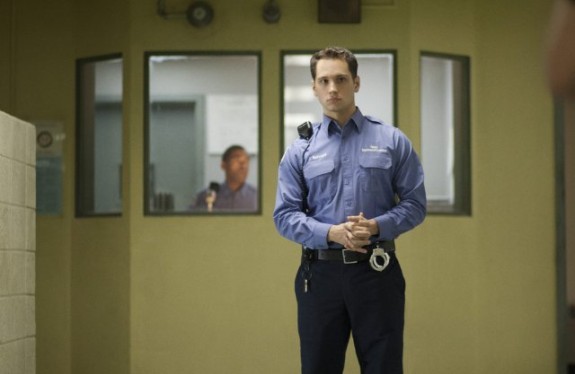My Success Is a Lie (How To Avoid Feeling Like a Fraud)
I skipped college and the “Traditional Career” to do my own thing. Then I started to panic. I felt like a fraud. Here’s how I overcame my own self-doubt (and how you can too).

“I kind of feel like a fraud.”
It was early 2009 and my friend Matt was showing me around New York City.
Matt had been pursuing an acting career for as long as I’d known him.
He’d performed at improv clubs around the city and even recently landed a few bit parts on TV shows my mom watched.
To me, it seemed like Matt was making progress.
But despite his successes, Matt felt like he was about to be “found out”; like someone would come by an audition and drag him out because he wasn’t a real actor.
And as we walked down the streets of Manhattan, I realized I felt exactly the same.
I Have No Idea What I’m Doing
A few months before, my book Built For Show had hit shelves nationwide. I’d go into Borders — it still existed back then — find two or three copies of it on a bottom shelf in the back, carry them to the tables in the front of the store, and place them in front of more successful books.
I’d sit in the in-store cafe, sipping that terrible coffee, and watch people flip through it. And I’d wonder, “What if they realize I have no idea what I’m doing?”
It’s not that I didn’t believe in my material. The advice in the book was solid. I knew it’d help anyone who read it.
But I was a 23-year-old kid with no college education, a small personal training studio in Montana, and some unpaid bills.
Who the hell did I think I was?
It was only a matter of time, I thought. Only a matter of time before everyone realizes I have no business doing any of this.
At any moment, I would be exposed as a fraud. On a large scale. And it scared the shit out of me.
 Me in my personal training studio 5 years ago with the new galleys of my book.
Me in my personal training studio 5 years ago with the new galleys of my book.
The Traditional Career vs Doing Your Own Thing
Feeling like a fraud or being worried that you’re gonna be “found out” is a common mindset for people who aren’t following a conventional career path.
Doing your own thing is always uncertain, with no clear signals that what youre doing is right. Meanwhile, the Traditional Career — which has been around for decades — is full of milestones.
The Traditional Career:
- Graduate high school
- Go to college
- Graduate college
- Land a job as “Bringer of Coffee”
- Work your way up to Senior Vice President or something
- Rinse and repeat until you’re 65
- Retire.
- All done! You can go on vacation and die now!
The Traditional Career is nice and tidy and predictable. It’s full of “Congrats! You made it!” milestones.
But when you’re doing your own thing, it’s tricky to spot the difference between accomplishments and setbacks. You’re just feeling it out and making assumptions.
When I graduated high school in 2003, I didn’t know anyone else who skipped college to start a business instead. In my community, there were only two options:
- Go to college, become successful, and be congratulated.
- Skip college, work a shitty job, and be pitied.
I was doing something different, and once I started to succeed, I felt like I was gaming the system.
I started to feel like a con artist. A cheater.
That’s when my inner voice started to yell at me and I started questioning everything:
Should I really be training clients? I don’t have an exercise physiology degree.
Should I really be writing articles? I didn’t go to school for that.
There are people way smarter than me out there.
Maybe I’m a fraud.
 What?! You didn’t go to college!?
What?! You didn’t go to college!?
The Traditional Career Isn’t Working
My story used to be uncommon. It used to raise eyebrows. “You didn’t go to college?! How did you pull this off?”
But in the last few years the failings of the Traditional Career are starting to make their way into the spotlight.
Here are a few troubling statistics about college: the average college grad leaves school sporting nearly $29,000 in debt, but starts his career on a salary of about $46,500; the typical monthly payment on those loans is just shy of $300; more than a third of college grads are underemployed.
Clearly, this isn’t working out.
But the News Isn’t All Bad
In response, something interesting is happening: society seems to be offering advantages to people who don’t follow a traditional path.
This is scary for most people. And it’s hard.
But it’s also a huge opportunity.
If the failure of the Traditional Career has a silver lining, it’s this: more people are starting businesses and becoming entrepreneurs — as James Altulcher puts it, people are starting to choose themselves.
But many of these new entrepreneurs feel like they don’t deserve it. I get contacted by people who feel like they’ve pulled one over on the world, just like I did.
They feel like frauds.
How to Stop Feeling Like a Fraud
After struggling with my own fraudulence for a while, I figured out two things that seemed to cause the feeling:
- I hadn’t defined what success meant to me
- I didn’t know the difference between “good uncomfortable” and “bad uncomfortable”
1. Define What Success Means to You
In the Traditional Career, “success” was graduating college and getting a job. But we’re playing by a different set of rules now, and we can’t compare this new approach to the old measures of progress.
To you, maybe success is living and working wherever you want. Or a certain amount of income every month. Or fewer hours working each week.
Maybe it’s being able to take your daughter to school every day and pick her up in the afternoon, or waking up every morning feeling optimistic and liking who you are when you go to bed at night.
And maybe it changes over time. When I first set out on this path, I wanted to make enough money to buy a mansion with a chocolate fountain and a spaceport; now my goal is to find the right balance between quality work and quality time with the people I care about.
You have to identify success on your own terms.
Once I defined what “success” meant to me, I had a way to validate what I was doing. I wasn’t gaming the Traditional Career anymore.
I’d invented my own rules for the game.
2. Learn the Difference Between “Good Uncomfortable” and “Bad Uncomfortable”
Part of doing your own thing is learning to be comfortable being uncomfortable. In other words, there will be times (lots of them) where you won’t know what to do in a certain situation.
It’s a good thing. That’s how you grow.
Unless it’s a bad thing.
Doing your own thing centers around knowing what you can actually handle and what you’re just not ready for.
Back when I was training clients eight years ago, I worked with a professional hockey player.
I was 20-year-old kid with a shitty personal training certificate. I had absolutely no business working with pro athletes.
While things didn’t end in disaster — far from it actually — I felt like a fraud the entire time. I felt like if people knew how far I was out of my scope, they’d take away my credentials. Blast me on the Internet. Put me in trainer jail.
And when it came to Built For Show, the simple truth is I felt like a fraud because I didn’t think 23-year-olds should write books. I remember sending an email to AJ Jacobs, one of my favorite writers, to tell him I’d just been published.
The first sentence of his reply said, “Congrats on the new book. You’re alarmingly young.”
Alarmingly? That’s not the adjective I wanted to hear. I read that sentence and alarms started sounding in my head.
The Bad Uncomfortable.
I shouldn’t have taken on a professional athlete so early in my career.
It worked out, but I felt like a fraud. In that case, it’s because I was trying to leapfrog the whole “experience” part of the job.
I was “bad uncomfortable”, and it was dangerous. I realized that, and I didn’t train another professional athlete until a few years later when I felt confident I could help them safely.
The Good Uncomfortable.
I’m glad I wrote the book when I did.
It was okay for me to write a book targeted to young guys who wanted to work out and meet girls. I may have been “alarmingly young”, but I was certainly qualified to write about the subject. All of the alarms were from leaving my comfort zone and pushing myself through an imaginary barrier.
I was “good uncomfortable”, and that discomfort furthered my career and led to personal growth.
 My friend Matt in his new role as Officer Bennet in Orange Is The New Black.
My friend Matt in his new role as Officer Bennet in Orange Is The New Black.
We’re Not Frauds
I caught up with Matt recently. Five years after our talk in New York City, things are going very well for him. His acting career is taking off. You may have seen him as Officer Bennet on the new Netflix show, Orange is the New Black.
He’s not a fraud. He’s an actor.
And me? I’m happy. Things are awesome. Better than ever. I’m trying to add as much value to the world as I can, and I’m surrounded with people who make my life better.
I still have no idea what the hell I’m doing.
The only difference?
I don’t feel like a fraud anymore.
29 Responses to My Success Is a Lie (How To Avoid Feeling Like a Fraud)
-
I am too a 23 year old guy who is living a life that very few people live to live a life that also very few people live… http://oposod.com/amityadav/daily-photo/73414818897210192920207495281847899409493286836526362332295513674701592444168 ….
-
Nate, great article man. I’m sure everyone who’s broken off from the conventional road to “success” and started their own thing can resonate with this – and should read this – including myself.
-
Great Article. Very inspiring.
-
This was definitely me when I opened my gym, and I was a little older.
But as long as you believe in what you are doing and not afraid to be a little uncomfortable here and there… It will all work out!
Here’s to the few that didn’t go the Traditional route! -
Nice article Nate. I recently wrote a blog post http://mattdragonmusings.blogspot.com about “finding ourselves” and how that is done by living life. Everyone dies, many people never live. I know that is cliche, it is also true. You’ve been living! Congratulations.
-
This couldn’t have come at a better time. I’m 24, full time engineer, and starting 2 businesses (among other things) – quite a struggle to say the least. While I don’t feel like a fraud at all (I’m here to kick ass) I found much value in your criticism of the traditional path and the feelings attached to doing your own thing. The torrent of good uncomfortable and bad uncomfortable culminates in adventures and experiences of immeasurable value and it is so worth it.
-
Great post. I’ve been off the grid for 10 months now and will keep pushing this entrepreneur thing until I go broke or make it.
-
Awesome blog Nate. I also went against the grain and while all my friends were at University (I’m a UK guy :) ) I qualified as a PT and built up my own business.
Fast forward 4 years and I’m my own boss, love my job, have more freedom than I ever thought possible and am making more money than the average 23 year old , graduate or not. (Not that money is the most important thing.)
A big part of this is down to you man — I followed your journey and thought “F*ck it, screw the traditional route, I could do something Like Nate.” Not going the traditional path is the best decision I ever made, and I owe you a lot for that, so thanks Nate.
Mike
-
This article sums up my feelings since I have left a big company and started my own. The 2 points are exactly what I need to work through to deal with the uncertainty. Thank you for sharing this post.
-
Awesome article!
One thing I want to specify: how do you really distinguish between good and bad uncomfortable? You said you weren’t ready to train a pro athlete, but how do you know you were ready to train a beginner? How do you know you were ready to write a book? How do you know you really weren’t ready to train a pro athlete? Knowledge and skills can always be better. How do you determine whether they are adequate for a specific job/project or not? (Before really seeing results, which confirm if you were good enough or not for the job.)
-
To jump in uninvited, here’s my take on “good uncomfortable” vs. “bad uncomfortable”:
I look at it like going down a hill on a skateboard: you can *always* go down the hill, and it’s always exhilarating and a little scary, but if it’s too steep you get that sick feeling in your gut that this decision may actually cause permanent and/or serious harm.
So it becomes an internal check before taking something on. Is this scary because it’s new and unfamiliar, but ultimately something I’m capable of? Or is this scary because I honestly have no idea what I’m doing and I’m going to have to pull it off by guessing and dumb luck?
I think being able to make the distinction is something that takes practice. After making a metric fuckton of really stupid mistakes because I was bad uncomfortable, I can identify the difference a little more easily.
-
Yes, yes, and yes.
-
-
-
Spot on, man! I’m on the same level now. My life is about to take off and I experience fear daily – that I don’t deserve abundance, happiness and a lot of uncontrollable fears appear out of the blue.
I think it’s about adapting our minds to a vision that we want for our lives – and of course, hustling meanwhile.
Thanks for the authenticity and openness, man. Appreciate it.
Have an exciting day!
-
Woah, I just read this after getting an email from an entrepreneuship guru asking to do a writeup on my new business. I’ve made, like, 5 sales and I don’t even have a website… “fraud” is exactly the word I’d use for how I feel. But first I was on NPR’s Weekend Edition, and then this blog writeup? I guess I am kinda doing it!
I did the Scrawny to Brawny program and I’d never worked out EVER before. I felt like a huge fraud then, too. I was drinking shakes, and going to the gym to do squats next to the most enormous dudes I’d ever seen. Once they realized I was coming consistently 5 times a week, they gave me advice, spots, high-fives, etc. And I was just a stick-thin dude then! 27lbs later, I still feel like a skinny fraud sometimes, but S2B really works at the inner brawny mentality as well as the outer appearance.
-
And it’s the “inner brawny”, as you put it, that will guide you through the rest of your life. Congrats on taking some big steps and getting adept at being “good uncomfortable.”
Awesome post.
-
-
This was an awesome read. I could copy and paste my life (and path) to yours and it’d be practically identical.
-
Hey Nate, you forgot a few things about the traditional career, and that’s to get married around 30, have about 2.5 kids in your early 30s, your family and career becomes your circle for the next 20 and then you get to enjoy the grand kids when you retire.
100 years later, the only people that will be interested in your life are genealogists. But at least your genetic material is out there.
-
Gawd I’m glad I’m not the only one who feels like this.
-
I’m surprised nobody has mentioned this already – this (well the fraud bit) is pretty much impostor syndrome https://en.wikipedia.org/wiki/Impostor_syndrome
I’ve struggled with it for a long time (and still do a bit) as a software engineer, and it’s more common than a lot of people think. Thanks for sharing your story with us.
-
I have huge admiration for you Nate and your success is an inspiration for many. However I do not agree that the ‘traditional route’ is necessary the wrong route. I am a 27 year old male and I am currently on what you call the traditional route. I had a fantastic four years in college, partied A LOT, made a ton of friends and I met the girl I am due to marry so I certainly have no regrets about my chosen route. After college I worked and saved and travelled the world and I will never forget some of the things I experienced.
Like many I haven’t worked exceptionally hard to get to where I am today but I can honestly say that I have enjoyed my life to date. I work to live, not live to work. I go to work at nine and I am home for five, I work in business so I have lots of social interaction and laughs throughout the day. I look after my health and play a lot of sport and I measure my success by how much I enjoy myself and how well I can perform in sport. Money is just an object to me, a means to an end and as long as I have enough to enjoy life, I am happy with this.
Now I would love the opportunity to start up my own business but in today’s economic climate, it is extremely difficult to get a house mortgage never mind getting financial backing for my own business. So for now I am going to continue on the ‘traditional route’, climb my career ladder and continue to enjoy myself.
I suppose what I am trying to say is that your route is brave and one to be admired but it’s not for everyone. And anyone who has chosen to take the traditional route should not regret this decision but instead make the most of what they have and enjoy living. -
Awesome stuff. Being a 24 year old business owner I can relate to the same feelings. Thanks for sharing your strategies.
Eric -
Great article Nate. I’m going through a similar path right now and I totally understand how you felt. I’m 27 and had the ideal normal job. I got my Aerospace Engineering Degree and MBA and worked for a few years. I quickly realized it was not gonna get me where I wanted to be.
So I decided to take the non-traditional path and am now working on multiple entrepreneurial ventures in the fitness industry. The business is starting to pick up and I have this weird feeling like I shouldn’t be this successful. But I gotta learn to embrace the momentum and harness my true potential. Thanks for the great read.
-
Nice. Thank you.
-
Great article Nate. This could’nt have come at a better time for me. I’m just starting out as a trainer, & I’ve definetly experienced the “fraud” factor. My passion keeps me focused though, so I forge ahead. Thanks again, Jeff.
-
Great post, spot on for where I’m at. Trying to redefine “success” after a life in corporate, when it’s all about getting the next promotion and the bigger pay cheque. Now it’s about making a difference and loving my life. But still recalibrating my measuring stick of success. P.S. Like that I’m probably not your “traditional” audience ;) ~ Tora
-
Love everything about this article. Glad that you finally decided to consider success in your own terms. It really is all about being okay with yourself. Some of the greatest people in history didn’t attend college. It’s not for everyone, but no ridicule to those who do choose college. Thank you for sharing.
-
Just read this again, and still think it’s awesome.
It even inspired me to write a blog on the same topic —
-
FRAUD? How is this for FRAUD!
I won A HERO T-shirt from Nate a couple of years ago! And
only at the start of this year REALLY I have started to become my own HERO!I Decided Fu*k It at the start of this year, I’m going to do
things on my terms and go down the unconventional route, I would consider myself to be a fraud if I didn’t. It hasn’t been easy; it’s been a tough slog, however I know it will be so worth it!Nate thank you so much for everything.
To find out how I’m going check out- https://www.facebook.com/pages/JrLeadwell/371633592921138
I can relate highly to this article. I am currently 23 and working as Head Physiotherapist for the biggest football (soccer) team in Thailand, some would say I am far too young. Keeping outside of the comfort zone is crucial in order to push forwards and discover new ground.
A book I would highly recommend for anyone who is going against the grain, and not working their way up the conventional career ladder is ‘The Icarus Deception’ by Seth Godin. It helped me to re-align my goals and encourages us ‘artists’ to face our fears and embrace failure on a daily basis.